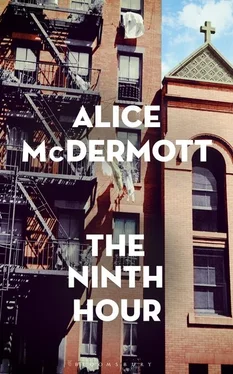And so lifted the burden of that terrible morning with some laughter.
But Annie never blamed the Church.
It was instead the recollection of her own unanswered prayers, simple as they had been, that made her grow cautious in her faith, wary of her own belief.
Let him get up, she had prayed—how often?—boiling an egg and making his tea and hurrying back into the silent bedroom to call him again. Hating her own desperation. Her own helplessness. Hating the way his gray moods and scarlet furies put himself between her and the simple happiness life was offering, a kind of paradise after the poor lives they’d left behind: this busy city, his good job, this tidy place of their own, a child coming in summer.
Let him get up and get going, she had prayed—avoiding his hand as he reached out from under the blankets he’d pulled over his head. Or, sometimes, giving in—she had done this, too—giving in to the luxury of what he wanted to believe: that their time belonged to themselves alone, that they could do as they pleased with it.
Now, at the kitchen window, looking into the black yard, tangled and wet, the tangle seeming to writhe in the sheen of falling rain, she stamped her foot and felt the old impatience that was as well her most vivid memory of her married life. Jimmy, get up.
Only her own pale face looked back at her in the gray glass.
Even his ghost was impossible to stir.
It was a cold hope at best to imagine otherwise.
The cold hope, nevertheless, that kept her in this apartment where he had died, where he had lived, when a smaller, cheaper place would do.
She woke Sally, and they both dressed and pulled on their rain boots. Annie carried the girl the five blocks to the convent, the big umbrella doing little good in the blowing rain, and arrived breathless and laughing, just as the nuns—their plain faces made plainer still by the lingering traces of sleep—filed silently into the chapel. In the bright convent kitchen, she shook the rain from her hair. Mrs. Odette had yet to arrive. Annie was rubbing a tea towel over Sally’s wet head, the two of them singing softly together, “It’s raining, it’s pouring…” while the sound of the morning psalm floated from the chapel. She saw a black and bent figure through the glass of the back door, heard the rattle of the milk bottles. Impulsively, she pulled open the door. Mr. Costello looked up, startled. Rain dripped from the peak of his glistening cap and from his nose. “Poor man,” she said. “Why don’t you come in?”
He stepped inside with no other thought than that he wanted to. He stood, the two fresh bottles of milk in his hands, the two gleaming empties under his arm, his coat dripping on the mat at the threshold. The kitchen itself was not unfamiliar to him, but never before had he seen it like this, so well-ordered and warmly lit, with a pretty child seated on the high step stool the nuns kept at the counter, a child big-eyed and curious, and the woman who helped out in the laundry, a tea towel in her hand, smiling to welcome him. No beauty, perhaps, but with lovely dark hair that was wet and plastered in black ribbons here and there on her pale forehead and white throat. Despite the noise of the rain outside, he could hear the sweet voices of the nuns in the chapel. They were singing “ O Salutaris Hostia ,” a hymn he had known since his boyhood.
Annie stepped forward to take the two bottles of milk from his hands. He saw that one strand of hair ran in a jagged line across her flushed cheek, nearly reaching her mouth, which was crooked and prettily bowed.
It was only the long habit of caring for a sick wife that made him, still dripping, reach out to brush the wet strand away.
He heard the closing notes of the hymn, remembered the Latin from school, the words that touched his exile’s heart. O grant us endless length of days, in our true native land with thee.
He was inspired to ask her, “Where are you from?”
* * *
THAT SAME AFTERNOON, Mr. Costello met her on the corner when she ran out to catch her breath. And then she saw him again on a brighter day as she left the butcher shop. He was, on occasion, paused in the doorways she passed. He greeted her, kept pace casually. He was as tall as she was, which was not tall for a man, and yet their shoulders never met. He did not offer to carry her bag. They walked to the park one bright day, and then as far as the promenade, where they sat, a good distance apart, on the bench. Even so, she could smell the stable on his clothes.
Their talk skimmed over everything. It was what made their hour together so delightful to her. He had a story to tell from the morning, or from only a few minutes before they met. He had a story to tell that was told to him just last Sunday after mass. She offered in exchange something Liz Tierney had said—a tale from the hotel, from her children. Since the first afternoon he had met her on the corner—out of the convent for an hour, thanks to Sister Jeanne, out to catch her breath—they seemed to agree that nothing was worth saying, here in the middle of her busy working day and at the weary end of his own, if it did not make them both laugh.
No mournful tales, then, of her widowhood, of his frail wife. No indignant recounting of Sister Illuminata’s demands during the endless hours in the laundry. No complaints from him about the cold weather or the milk trains or the vague and endless demands of customers and bosses. They sat apart as strangers might on a bench in the park, and their talk skimmed over all that preceded the time they were together and all that awaited them the rest of the day.
A year of this, and then she pressed the key to the downstairs door into his hand. “Come up” was all she said, and walked ahead of him in the street. At the corner, she glanced over her shoulder to see that he had already crossed to the other side. It pleased her that he knew enough to place some time between them.
She left the door ajar: she wouldn’t have him knocking for all the neighbors to hear. She left the door ajar and sat in the living room, in the single chair, so she could hear his step or see his shadow as he approached.
She wondered how long he would keep her waiting. How much discretion she would have to endure.
She folded her hands, one over the other on her lap. They were not smooth. He would not, she was certain, expect them to be.
She thought of his own pale hands, big farmer’s hands that belonged to a stouter man. His thick shoes, a piece of straw sometimes caught in a cuff or entangled in the frayed laces.
The door was ajar. The glass transom above it was closed. It was a cold bright afternoon in midwinter. The room was poor. The slipcover she’d made to hide the scorched couch was ill-fitting, the fabric dull, as if faded. The picture she’d hung above it was too small for the wide wall. It was a heavily framed oil of the Sacred Heart, the image darkened by time. It had arrived in the donation basket—the frame was chipped and there was a tear in the canvas. “Coals to Newcastle,” Sister Illuminata had said when she saw it, but little Sally was enamored, and Annie herself had felt some piety when she hung it up—stood on the couch in her bare feet, drove the nail, Sally watching her from the floor. It seemed a pretension now. In her time at the convent, her eyes had grown accustomed to authentic elegance—the beautiful house itself, built for a wealthy man: the gleaming woods, the simple chandeliers, the plaster ceiling roses and graceful corbels. There was no denying that this bare room was a poor woman’s room, an immigrant’s small space. No denying that its spare cleanliness betrayed an immigrant’s reserve. Twice since Jim died, she’d hung it with new paper—and now as she waited, she could see in the far corner that the latest attempt had already begun to curl. Twice she had repainted the kitchen walls, the bedroom walls.
Читать дальше










